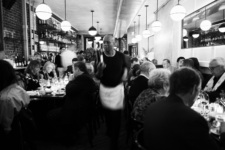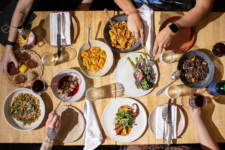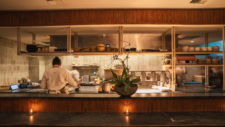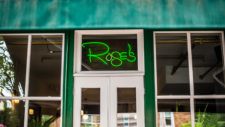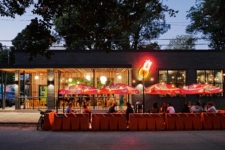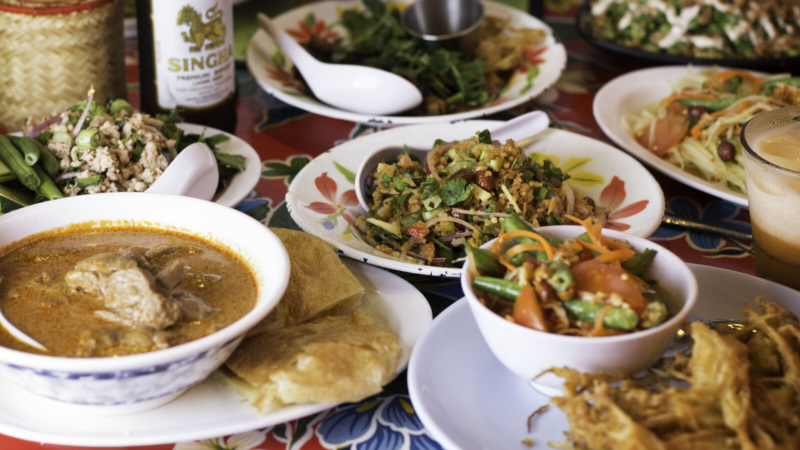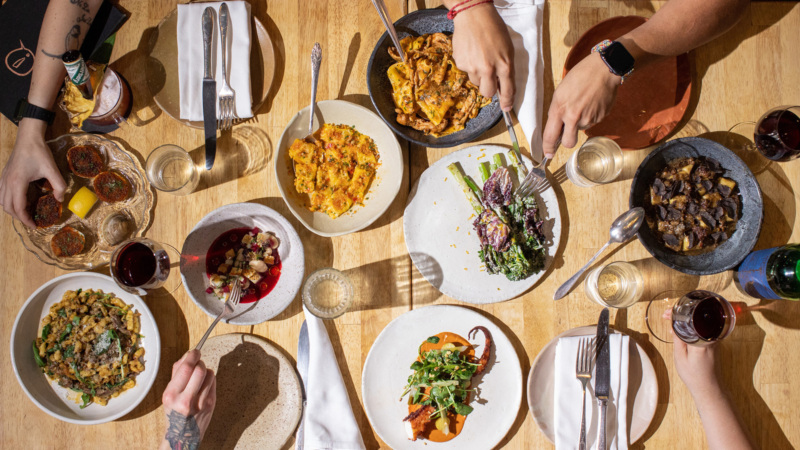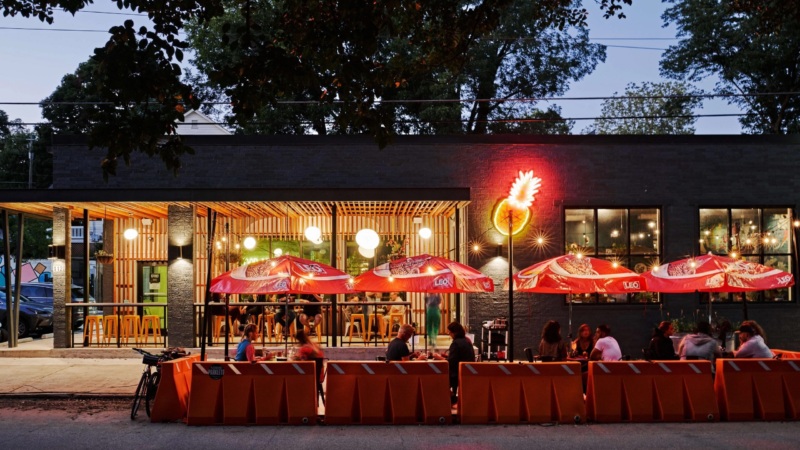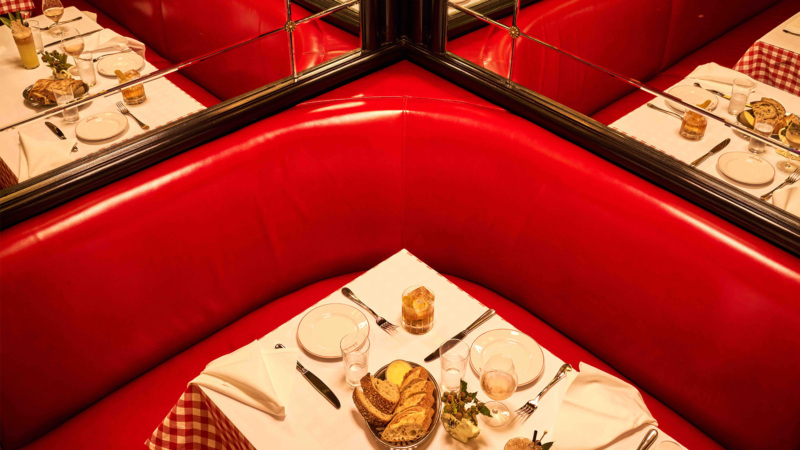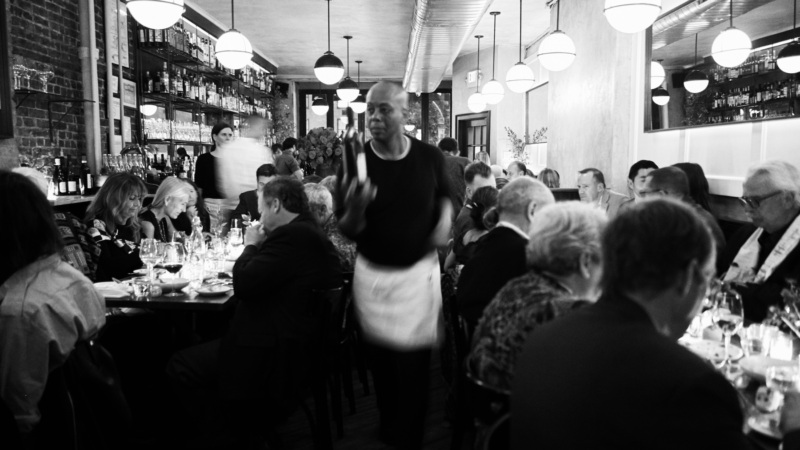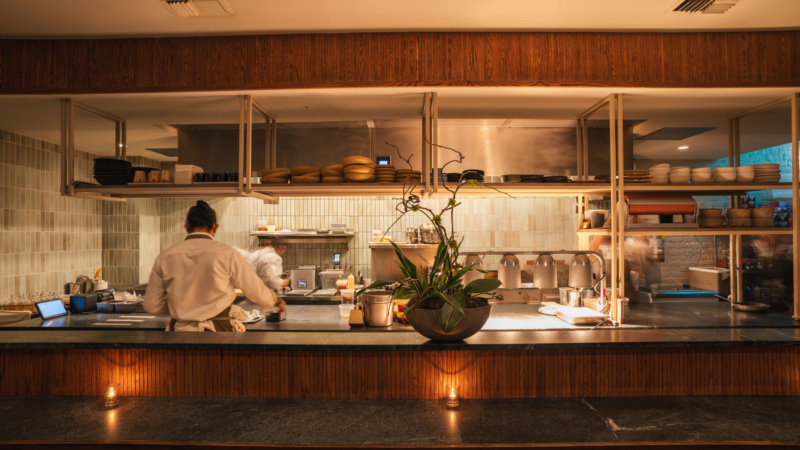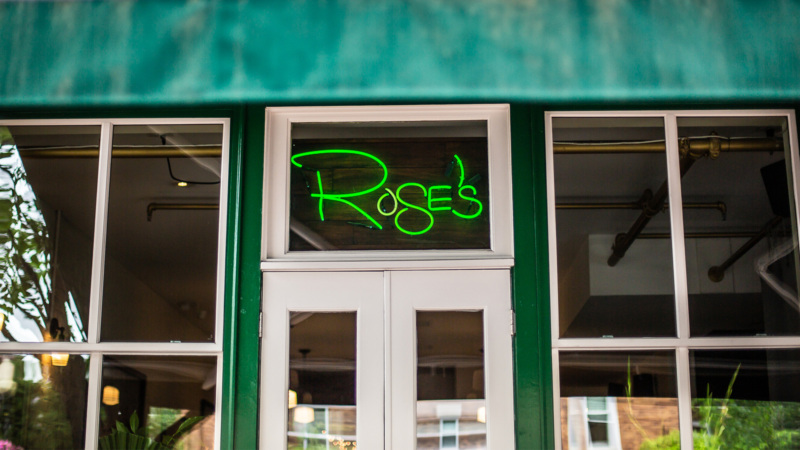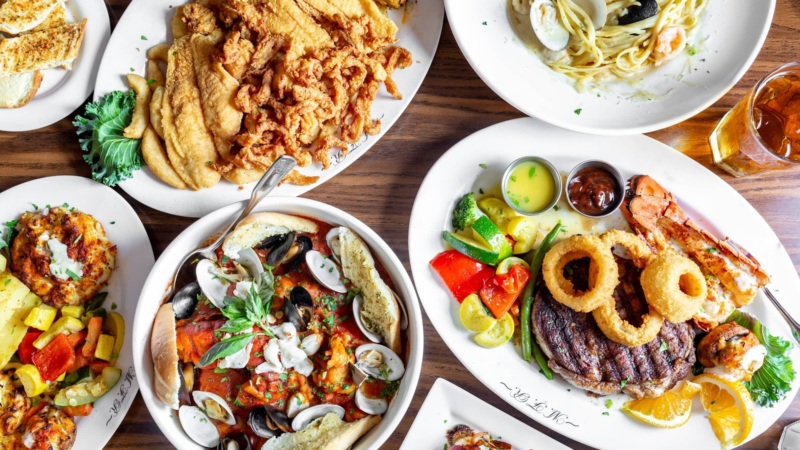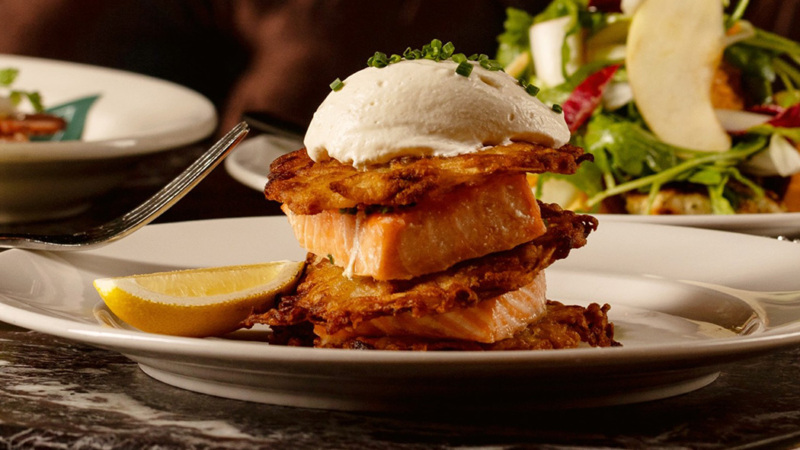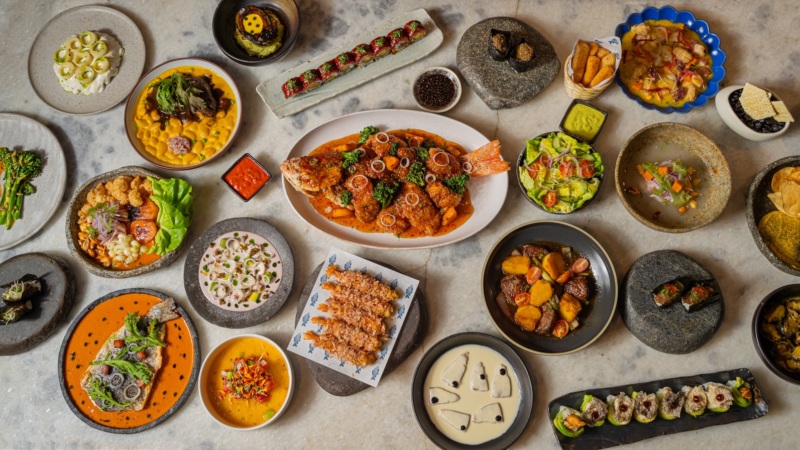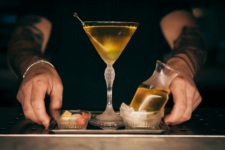
No. 1
Petit Trois solidifies the holy trinity of hot shot chefs
— 2014 —
The most hotly anticipated opening in 2014 was Petit Trois, a 20-seat love letter to Parisian bistro culture from then-ascendent French rock star chef Ludo Lefebvre, in partnership with two equally white-hot chef friends, Jon Shook and Vinny Dotolo of Animal and Son of a Gun. Petit Trois came on the heels of the trio’s first venture, Trois Mec, which opened in 2013 in a strip mall in Hollywood and took off like a rocketship for its bold take on French fine dining and its then-novel ticketed-seat reservation system. Petit Trois solidified its partner’s reputations as L.A. hitmakers, eventually spawning a sibling in the Valley, and a now-shuttered sequel called Trois Familia. Petit Trois L’Original and Le Valley are beloved to this day for classics like French onion soup, the Big Mec cheeseburger, and the Boursin-stuffed omelette, while multiple locations of Jon & Vinny’s are beloved by local diners.
No. 2
Night + Market Song shakes up the traditional Thai scene
— 2014 —
L.A. county is home to the largest Thai population outside of Thailand, and the country’s first Thai Town, to boot. But the Thai food scene here got a much-needed jolt of electricity when Kris Yenbamroong started Night + Market as a popup inside of his parent’s longstanding Sunset Strip restaurant, Talesai, serving in-your-face regional Thai dishes like party wings, jungle curry, and pork blood-and-MSG dipping soup. It proved so popular that in 2014, Yenbamroong opened his own storefront in Silver Lake, complete with neon tabletops, a blaring indie sleaze soundtrack, and a thoughtfully vetted natural wine list. Yenbamroong eventually took over the family business entirely, and has since opened another Night + Market in Venice (and taken over Talesai completely)—inspiring the next generation of Thai restaurateurs along the way.
No. 3
Baroo 1.0 brings its funky ferments and freewheeling spirit to a Hollywood strip mall
— 2015 —
“Before you read any further, you should probably know that the restaurant I’m about to describe has as its specialty a pink, creamy plate of mold,” began Jonathan Gold’s glowing review of Baroo. Crammed into a strip mall across from the Hollywood Forever cemetery, the first iteration of Kwang Uh and Matthew Kim’s impossible-to-define restaurant captured the experimental mood of the time. The cooking was refined and highly personalized, borrowing equally from Asian and European flavors, with a dash of mad scientist thrown in. It was weird and wonderful—the kind of “only in L.A.” spot that food writers love to say embodies the freewheeling spirit of our city. And then, almost as quickly as it began, it ended, as long waits and unexpected closures overwhelmed the small business. A burned-out Uh retreated to a Korean monastery, where he met his future wife and business partner, Mina Park, and Baroo resurfaced a few times between 2018 and 2021, in pop-up and flea market iterations, but it wasn’t until earlier this year that a new, fully fleshed out, grown-up version of Baroo rose from the ashes in a shiny new location in DTLA. Welcome back.
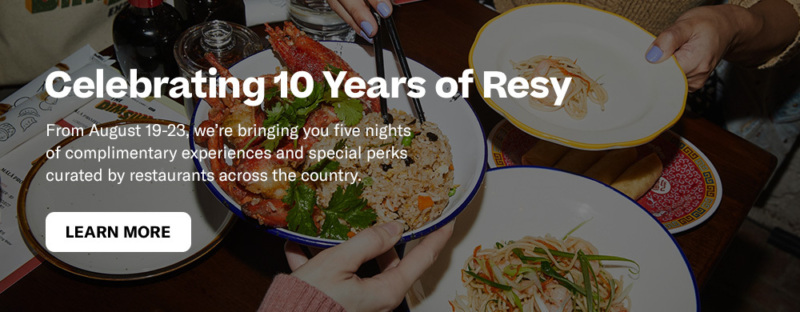

No. 4
Guelaguetza represents Oaxacalifornia on the national stage
— 2015 —
Opened in 1994 by Fernando Lopez and Maria Monterrubio, Guelaguetza established itself as a focal point of L.A.’s robust Oaxacalifornia community. The always-festive restaurant is beloved for its faithful renditions of Oaxacan dishes like mole, tlayudas, and plenty of mezcal. When the James Beard Foundation recognized Guelaguetza with an “America’s Classic” award in 2015, it became the first traditional Mexican restaurant in the country to be designated as such—a major moment for legitimizing the contributions of Mexican immigrants in California and beyond. Today, the Lopez children continue running the family business, with savvy expansions like online retail for their famed mole and Michelada mix. And though the city’s Oaxacan food scene has evolved, Guelaguetza is still widely regarded as the elder statesman—a classic for a reason.
No. 5
Botanica and Kismet put a chic spin on California cuisine
— 2017 —
Worshiping seasonal produce is nothing new for California chefs. But in 2017, a pair of new restaurants—both highly anticipated and female-led—helped usher in a fresh vision of the brightly flavored, unabashedly vegetable-driven, herb-strewn California-Mediterranean cuisine that today has become all but shorthand across L.A. Kismet, helmed by chefs Sara Kramer and Sarah Hymanson, opened first in Los Feliz with a Middle Eastern-leaning menu in a sunny blonde wood space. A few months later, food writers Heather Sperling and Emily Fieffer debuted the equally stylish, vegetable-focused Botanica in Silver Lake, which doubled as a shoppy shop before we even knew what that meant. Both drew fashionable crowds in their hip East side neighborhoods, all clamoring for vaguely healthful food that looked as good as it tasted. Many restaurants in L.A. today tap into a similar formula, but few pull it off as organically as these two.
No. 6
David Chang brings the Momofuku juggernaut to town
— 2018 —
After months of rumors (and the inevitable delays), in January of 2018, Momofuku ringleader David Chang finally opened Majordomo, his sprawling, long-awaited first L.A. venture in a low-traffic industrial area dubbed “far Chinatown.” The hype machine kicked into full gear, with breathless local coverage and lines forming nightly. And the pressure was on for Chang, knowing that Angeleno diners are not always welcoming to Yankee carpetbaggers. The chef largely delivered the goods, turning out genre-busting dishes like ssam-style smoked short ribs with beef fat-fried rice that blurred the line between Korea and Texas, all in a sleekly designed space that felt like his first grown-up offering in a new city. Critical response was largely positive (Eater critic Bill Addison called Majordomo “the most exciting restaurant to open in 2018”), and the impact was undeniable: a major chef swung big and successfully staked his claim in L.A.
No. 7
The city mourns the loss of Jonathan Gold
— 2018 —
It’s hard to imagine in the smartphone era, but there was a time where L.A.’s notorious sprawl made it feel impossible to decipher, food-wise. Immigrant enclaves catered largely to their own communities—not restaurant critics, who were typically too busy twirling their mustaches in temples of fine dining. That all changed with Jonathan Gold, native son and prolific critic for L.A. Weekly (where in 2007 he was the first restaurant critic to win the Pulitzer Prize) and L.A. Times, who viewed hole-in-the-wall strip mall joints and roving food trucks with equal (if not more) importance as capital-R restaurants. “I am trying to democratize food and trying to get people to live in the entire city of Los Angeles,” he once said. His mission was, by and large, hugely successful, as he almost single-handedly introduced huge swaths of dedicated readers to the pleasures of cuisines outside of their comfort zones and normal commutes. His sudden death, following a short, private battle with pancreatic cancer, came just a month after the suicide of fellow food writing luminary Anthony Bourdain, and rattled L.A. to its core. “He, more than any chef, changed the dining scene in Los Angeles,” said his longtime friend, Nancy Silverton of Mozza. “He really was the ambassador for our city.”
No. 8
Alta Adams rises from the ashes of Locol
— 2018 —
We can’t talk about Alta Adams without first talking about Locol, Roy Choi and Daniel Patterson’s grand experiment in bringing healthy fast food to underserved neighborhoods (in this case, Watts). After opening with a bang in early 2016, the chainlet struggled to maintain customers in Watts, and the Oakland location received a scathing zero-star review from New York Times critic Pete Wells. By August of 2018, Locol Watts had shut down restaurant operations, but from its ashes, Patterson and former Locol line cook (and Watts native) Keith Corbin took over a storefront in West Adams, another historically underserved-yet-rapidly-gentrifying neighborhood. With a menu of affordably priced “California soul” food including seared oxtail and black-eyed pea fritters, the sit-down space was designed to appeal to the local Black community as well as neighborhood newcomers. And by all accounts, it has worked: while West Adams continues to transform, Corbin is now a two-time James Beard Nominated-chef and bestselling author, and Alta Adams has comfortably settled into its role as both beloved neighborhood staple and destination for diners from across the city
No. 9
The pandemic era. Reform and reckonings upend the restaurant industry
— 2020 —
How to sum up the most catastrophic year in recent history, particularly as it relates to the restaurant industry? Between Governor Gavin Newsom’s first shelter-in-place decree the week of March 15th and the end of the year, restaurants were forced to contend with a seemingly never-ending string of often conflicting rules and regulations.The industry was rocked simultaneously with a lack of federal support; a racial reckoning spurred by the death of George Floyd; supply chain issues; and multiple rounds of whiplash-inducing stay-at-home mandates. There were a few glimmers of hope: emergency initiatives allowed for to-go cocktails and expanded outdoor dining, and many chefs got creative with takeout offerings. Pop-ups flourished, including several that have since graduated to successful brick and mortar operations (see: Bridgetown Roti, the newly James Beard-anointed Kuya Lord, Quarter Sheets). But good news was in short supply. By the end of the year, the Nation Restaurant Association estimated that 110,000 restaurants across the country had closed due to the pandemic.
No. 10
The writer’s strike delivers another fatal blow
— 2023 —
Last year was another catastrophic one for restaurants. In May 2023, the Writer’s Guild of America went on strike against the Alliance of Motion Picture of Television Producers. Some 11,000 screenwriters were joined in July by 160,000 members of the SAG-AFTRA union, creating one of the largest work stoppages in Hollywood history. In L.A., where the hospitality business is tightly intertwined with the entertainment industry, such labor disputes have far-reaching consequences—studio-backed catering orders dry up, power lunches and private events disappear, and out-of-work writers and actors cut back on discretionary spending. For an industry just barely crawling back from the pandemic, the strikes were another devastating blow. Even as many restaurants stood in solidarity with union members, offering discounts and providing food at the picket lines, business plummeted, by as much as 40% for some. Between the strikes, inflation, increasing labor costs, staff shortages, and pure, unadulterated burnout, dozens of notable shuttered this year, including Jon Shook and Vinny Dotolo’s groundbreaking first restaurant, Animal, Wes Avila’s critically beloved Angry Egret, Carlos Salgado’s Michelin-starred Taco Maria, and Nancy Silverton’s handsome Hollywood hotel restaurant The Barish. It’s a bleak note to end on—but a harsh reality for an industry that needs our support more now than ever.
Jamie Feldmar is Resy’s Los Angeles editor and a five-time cookbook author. Follow her on Instagram. Follow Resy, too.
